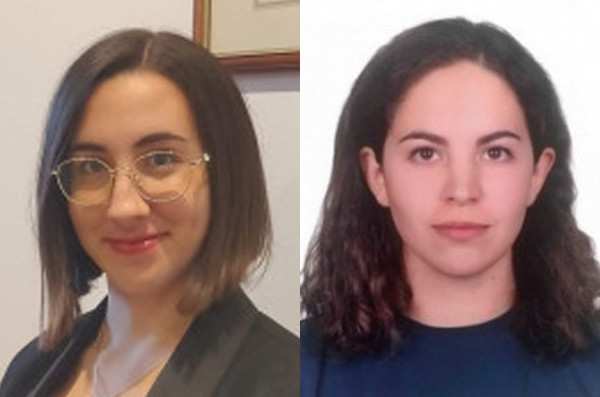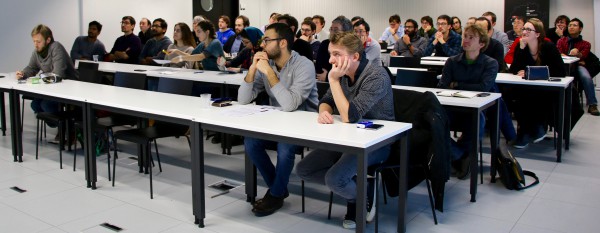MARVEL Junior Seminar — February 2024

Each seminar consists of two presentations of 25 minutes each, allowing to present on a scientific question in depth, followed by time for discussion. The discussion is facilitated and timed by the chair.
Note that the format has been recently changed, as the pizzas will be served AFTER the seminars in order to facilitate discussions based on the talks just presented. This seminar also takes place on a Friday rather than the usual Thursday.
Onsite participation
12:15 — Seminars take place in EPFL room Coviz2 (MED 2 1124)
~13:15 — Pizzas will be served in the MED building atrium, second floor
Online participation
Starting at 12:15:
https://epfl.zoom.us/j/68368776745
Password: 1923

Abstracts
Talk 1 — Mass-zero constrained dynamics for solvation processes
Federica Troni, Sara Bonella
European Center for Atomistic and Molecular Simulations (CECAM), EPFL
Explicit evaluation of solvation forces in large scale simulations constitutes a computational challenge especially due to the necessity of including thousands of solvent (e.g. water) molecules in the simulation. A faster alternative has been found in implicit solvent models, where the solvent’s molecules are treated as a dielectric continuum [1]. However, using implicit solvents implies solving the 3D Poisson-Boltzmann (PB) equation that describes the electrostatic forces at each step of a molecular dynamics simulation for the solute. This is currently done with relatively expensive self-consistent schemes, whose numerical cost limits application to large systems and, in particular, to biologically relevant complexes [2]. We are exploring an original method to mitigate these costs. This is done by extending and adapting a recently proposed approach for the evolution of adiabatically separated systems, called Mass-Zero constrained dynamics (MaZe) method [3]. In this talk, I will show you the theory behind the new approach and the proof-of-principle of the algorithm, focusing on its specific features and comparing it with the standard approach to solve the PB equation: the finite-difference method [4]. Moreover, I will illustrate how the first results obtained are motivating a generalization to more complex system and implementation of the MaZe approach in OpenMM or NAMD. Our main target applications are biochemical. Comparisons with alternative approaches developed for materials [5] will also be performed in future work.
[1] Roux, B., & Simonson, T. - Biophysical chemistry, 78(1-2), 1-20, (1999)
[2] Im, W., Beglov, D., & Roux, B. - Computer physics communications, 111(1-3), 59-75, (1998)
[3] Coretti, A., Bonella, S., & Ciccotti, G. - The Journal of chemical physics, 149(19), (2018)
[4] Klapper, I., Hagstrom, R., Fine, R., Sharp, K., & Honig, B. - Proteins: Structure, Function, and Bioinformatics, 1(1), 47-59, (1986)
[5] Fisicaro, G., Genovese, L., Andreussi, O., Marzari, N., & Goedecker, S. - The Journal of chemical physics, 144(1), (2016)
Talk 2 — Exploring the Influence of solvent on the absorption and fluorescence spectra of Coumarin-6
Beliz Sertcan, Jürg Hutter
Department of Chemistry, University of Zurich (UZH)
The energy, properties, dynamics, and reactivity of a molecule are influenced by the surrounding solvent. Given that numerous chemically significant excited state phenomena occur in solution and complex interfacial settings, such as photosynthesis, photo-induced charge and proton transfer, as well as fluorescence in biological systems, it becomes crucial to model these excited state reactions accurately while simulating the solvent environment. The solvent environment exerts a significant impact on an absorption spectrum, primarily through factors like polarisation and direct solute–solvent interactions, including hydrogen bonding. Using advanced computational techniques, particularly linear-response time-dependent density functional theory (LR-TDDFT) framework within CP2K, we aim to understand how the absorption and fluorescence of Coumarin-6 changes in different solvent environments, employing implicit and explicit solvent models.
Check the list of the next MARVEL Junior Seminars here.
Low-volume newsletters, targeted to the scientific and industrial communities.
Subscribe to our newsletter